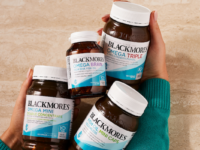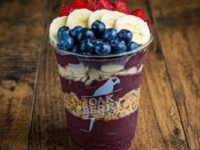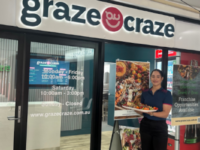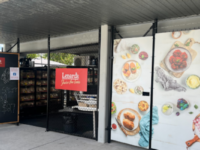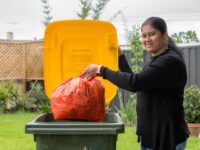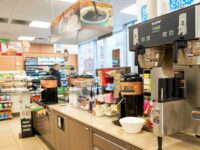
Angus McKay, 7-Eleven Australia CEO, chatted with Inside Franchise Business Executive in a Q&A about the new kiosk model, delivery, defining customer service and supporting franchisees through the pandemic.
7-Eleven is introducing a new format store in Brisbane. Tell us about it.
This is the second in the country. It’s an on-premise store, part of someone else’s property. The notion is to use larger businesses where the employee base is captive and looking for convenience. We’re on an industrial site in Melbourne. This [Brisbane] is more of an office block site that we’re testing.
It’s a fraction of the size of a standard store, one wall is eight to 10m long, it has a reduced but complete range. The two stores are very different based on the people in the location. The commonality is cold beverages, fresh sandwiches, bakery. The distinctions include whether or not to include a coffee machine.

We work with the site owner on an employee offer. It’s not about exclusivity. The industrial site has cafes but they are a drive away. At the office building the cafes are plentiful in the area. But if you only have half an hour for a lunch break, the 7-Eleven store is convenient.
I’m happy to go head to head with any other business but it’s about what the customer wants.
The notion of convenience is different. It was a corner milk bar when I grew up. That requires walking or driving to it. That notion is very old-fashioned. Every consumer defines convenience differently.
If you want a coffee, you might want it delivered. Time is precious so how do we help customers do things faster and simpler. That’s where we start.
Of course we’re not going to keep doing it unless we can make money out of it.
How does this fit into the growth strategy?
It’s too early to say it will conquer the world, but I can see how it could.
We have to decide if this model is corporate or franchised. The store needs to be serviced, and you can’t put product on the shelves at 6am. Someone has to do that. So maybe corporate support to service a few stores in an area is the solution. Or it could be an addendum to an additional franchisee store. That’s what were trying to work out. We’re picking up the bills until then.
How is franchise recruitment affected by the current crisis?
Up until the end of February we were flying, enquiries were fantastic. In March it was as if a vacuum cleaner came on and everyone stopped talking. In April some [franchise buyers] started to withdraw around credit availability, some asking themselves, ‘Do I really want to open a business now?’ Some credit is harder to get.
However enquiries are returning now and we’re seeing the pipeline opening up again.
Last August there was an expectation of 15 stores across Queensland and WA over two years, as part of a steady 20-30 store annual growth. What’s the latest?
This last fiscal year, we didn’t deviate substantially from our opening plans. We’re preserving cash but have not materially changed gross store opening numbers. Queensland has dominated store openings, in this fiscal year it will be Victoria, and those plans are well set.
Covid-19 has been a speedbump for us, but it’s not a monumental one. Business has travelled well.
What we now have to look at is what stores should we be closing based on economic circumstances. There’s no traffic in the cities. Suburban stores have traded very well, city stores are hurting.
What are the particular elements of the 7-Eleven franchise system that have helped franchisees during the pandemic?
In the first place, in the first week, other than Coles and Woolworths everybody stopped.
We were all concerned, ‘Can I go out, will I catch it?’.
Franchisees wanted to know what it meant for them. Sales stopped but we underwrite the profit contribution, and that really stood the test of time.
All franchisees, even if they didn’t use the assistance, valued it, knowing it was there.
The fact that we didn’t change it or turn it off, we did what we were supposed to do was a huge comfort as they try to rebalance their business.
Part two of this, as we worked with different stores, we treated every store uniquely.
Where a business might have had more distress, we would work through with banks, tailor the roster, in a couple of cases, close temporarily or reduce hours. We tried to have quite a bespoke approach.
Now we’re into another phase, some stores are well into recovery, what are we doing to help them shine?
In Victoria we have a whole lot in lockdown, we have to go back to the well again. We have to consider if they can play in stage 3 again – from a store perspective, what is the gross profit level, rebalance labour, get stock levels right.
In the 7-Eleven model, the fixed costs, rent and utilities, we take care of.
The support staff, field managers, would be sharing the franchisees’ burden. How do you help them through this?
Everybody is impacted but particularly on the frontline those serving customers, and those supporting those serving customers.
We make sure they have the tools, are clear on priorities, we’ve been diverting other resources from the business to supplement the staff, and making sure we look after their welfare from both a physical and mental safety perspective.
They’ve been doing a brilliant job.
7-Eleven has maintained its innovative streak – can you give us an update, it’s been three months since delivery was first trialled?
Delivery is now in Sydney and Melbourne and steadily growing.
We are learning what people want delivered from 7-Eleven. You can see when AFL started, because everyone wants chips and Coke – we can work out from when the orders were placed the time of kick-off.
That goes back to the notion of what convenience is. What do customers want as a delivery service? Is it delivery now or in two hours? We can look at high rise versus suburban customers. We’re mining the data to understand.
There’s no doubt it has a place in our future, as does the kiosk.
We’re learning all the time.
When it comes to product, you can do as much market intelligence as you like but you have to put it on the shelves and see how it trades. We’ve introduced a whole lot of plant-based product, and it’s gone nuts.
Our catering trial was part of our continuous innovation, it is currently paused as we enhance our e-commerce capabilities.
Our cashless cardless store at our Richmond office has been a tremendous success. Customers love it and it has highlighted its potential. The store is currently closed due to Covid-19 work from home requirements, but the technology is being used in the microformat trial store. We’re continuing to learn more as consumers interact with the technology.
It has a place in our future. We will be looking at how we might be able to roll it out in addition to traditional style point of sale technology in future.
With the fuel app, major enhancements will roll out at the end of the calendar year.

What’s been learned during the pandemic that will shape a future 7-Eleven?
We’ve learned that speed counts. You’ve got to be nimble.
You’ve got to be clear around priorities. We have three: customer safety, employee safety and employment security, and network viability. Everything lines up behind these priorities.
You have to think how you can start to accelerate what’s moving, digital is moving quickly, now it’s going even faster. How can you take a few more risks? Our consumers are happy to give something a go.
The biggest lesson is how you look after each other. In our world, we’re only as good as the people who operate our stores. If they felt we didn’t have their back, we couldn’t have done it.
What has been 7-Eleven’s experience with rents?
Our experience is the same as yours – we’ve seen the best and worst in businesses. With rent we’ve had some landlords turn round and say, ‘you’ve been a great tenant what do you need?’. Some others have dug the trench and won’t move.
That goes to the long term, we now have a point of view of who are partners, and who aren’t.
And in the stores, what people do behind the scenes, they are very generous. We’ve had an initiative to recognise local heroes, it’s wonderful stuff.
In hard times, that’s what makes the world turn.
This article was first published on sister site Inside Franchise Business Executive.






